Fitness
9 Ways to Optimize Neurotransmitters for Better Brain Health (Part 1)
October 1, 2024
Neurotransmitters, those busy bees buzzing around 24-7, are key in the communication between your body and brain.
When your neurotransmitter levels and their signaling pathways are optimized, your nervous system can process information efficiently and communicate with your body during a board meeting, a workout, or sex.
You can fall asleep and stay asleep, overcome anxiety, and resist the temptation of that extra pint of chocolate coconut milk ice cream in your freezer. You have the focus and concentration to pore over books and websites while absorbing the precious data you seek. You are, in effect, well on your way to becoming boundless.
But let’s face it. Your brain ain’t perfect.
Yep, that giant gooey mash-up of neuronal cells, white matter, gray matter, blood vessels, nerves, and squishy tissue sometimes goes south, and, as a result, most of us walk around with broken, inflamed, poorly functioning, and poorly trained brains. When you think about it, it’s kinda sad that you have a supercomputer in your cranium that’s currently firing like a set of cheapo, half-broken Christmas lights from the general store.
If you’ve ever wondered why, despite your best efforts, you’re still not hitting your peak performance or feeling fully like yourself, it’s time to dig deeper. In Part 1 of this article, you’ll get to discover how neurotransmitters work, why they are crucial for your mental and physical well-being, and how imbalances can affect your daily life. You’ll also learn about different types of neurotransmitter dominance, how to identify your own, and practical tips for optimizing your brain’s communication system. By the end, you’ll have actionable strategies (in Part 2, which I’ll release soon, you’ll gain access to more advanced brain-enhancing tips) to increase your focus, mood, and overall cognitive function, setting you on a path to becoming the best version of yourself.
If you’re ready to restore balance to your brain and reclaim your mental clarity, emotional stability, and overall well-being, this article is for you.
It’s not just about fixing what’s broken—it’s about unleashing the full potential of your brain. So, let’s dive into the world of neurotransmitters and get your brain firing on all cylinders again.
How Neurons Work
There are multiple ways this amazing machine can wind up functioning at subpar levels. But to understand how the brain can malfunction, you first need to understand how nerve cells communicate with each other.
Your brain communicates with the body through a network of nerve cells, or neurons, which transmit messages via action potentials—electrical charge imbalances.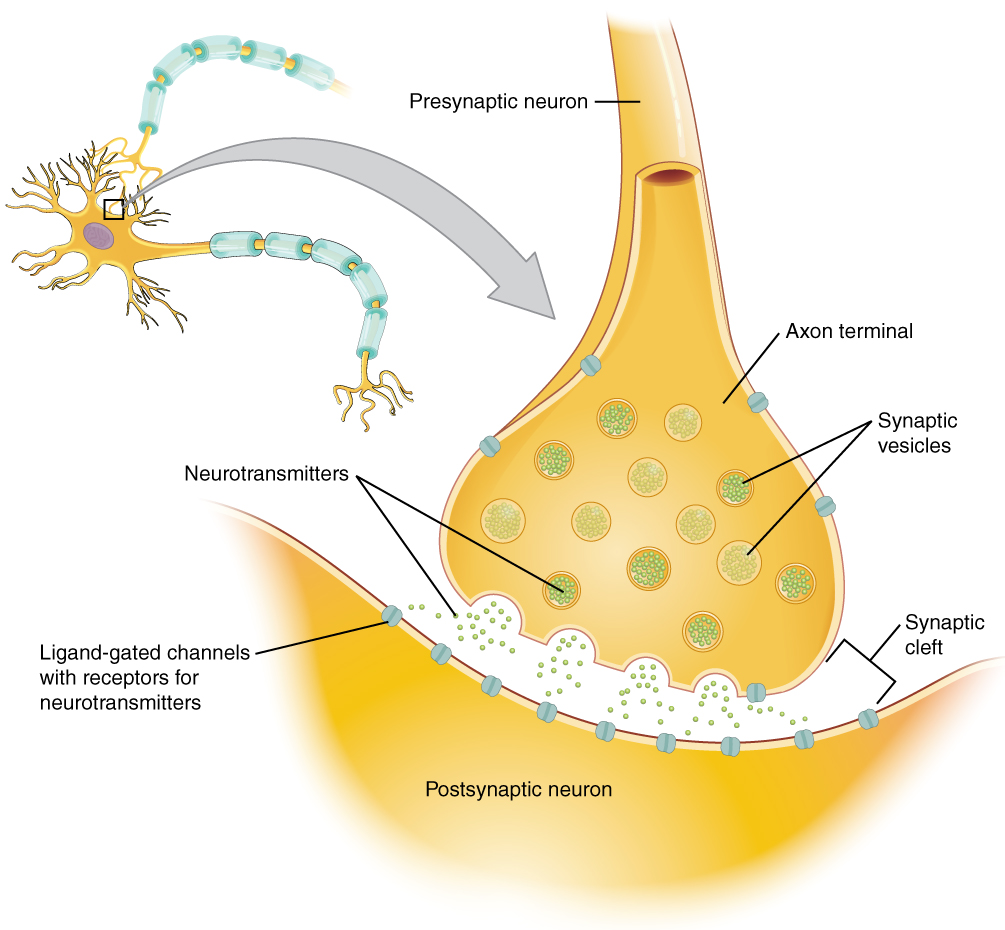
Each neuron consists of dendrites that receive messages and axons that send them. However, neurons are not physically connected. Instead, they communicate across a gap called the synaptic cleft.
The presynaptic neuron releases neurotransmitters into this gap, which then bind to receptors on the postsynaptic neuron, continuing the chain of communication. This process repeats with each neuron taking turns as the presynaptic and postsynaptic cells until the message reaches its destination.
But suppose you had a serotonin deficit, which would compromise the synaptic transmission of any signals dependent on serotonin. This could quickly lead to: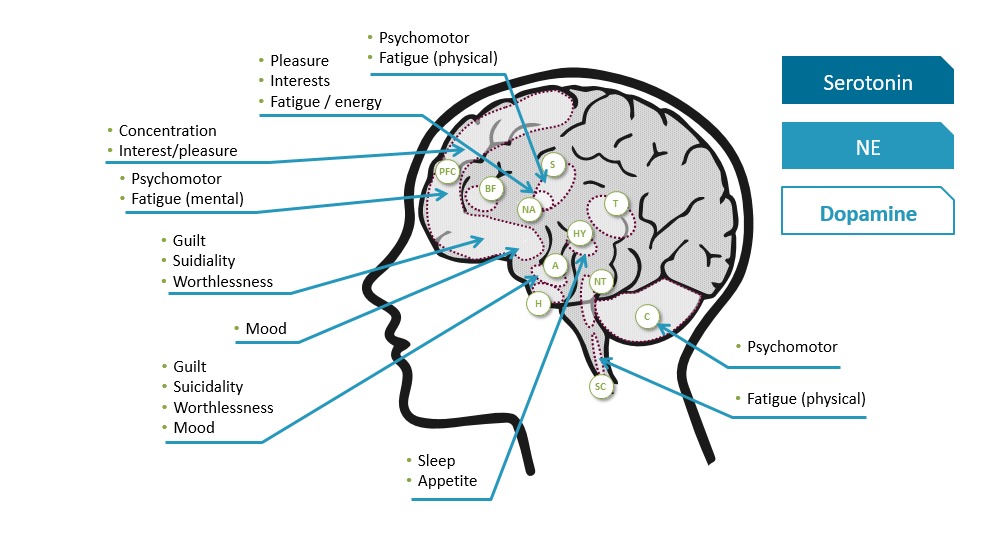
- Depression
- Food cravings
- Brain fog
- Reduced reasoning skills
- Anxiety
- Panic attacks
- Insomnia
- Eating disorders
- Migraines
- Distractibility
You have probably experienced at least one of these issues before, right? Fact is, millions of people walk around every day with some kind of neurotransmitter deficiency, excess, or suboptimal neuronal communication. The symptoms of a neurotransmitter problem depend on the kind of neurotransmitter involved.
Your Unique Neurotransmitter Dominance
In addition to neurotransmitter imbalances and deficits, you likely have some neurotransmitter dominance as well.
Most of us naturally tend to have higher levels of a certain neurotransmitter, which causes us to exhibit behaviors associated with that particular neurotransmitter.
Each kind of neurotransmitter dominance has its strengths—such as better motivation, drive, emotional stability, or stress response—and its weaknesses—such as a tendency toward anxiety, burnout, or fatigue. If you’re dominant in a particular neurotransmitter, there’s no need to try to reduce your levels of that transmitter. Instead, use your understanding of that dominance to better determine your particular cognitive skills and which exercise and eating protocols could work best for you.
Here’s my overview of neurotransmitter dominances, with my apologies if these read like astrological assessments. Trust me: they’re far more accurate than astrology. You’ll likely recognize yourself in one of the descriptions here, but if you’d like to confirm your dominance with a quiz, visit www.bravermantest.com.
Here’s a bit more on the science behind these dominances, should you care to read up on it.
Dopamine Dominance
If you’re dopamine dominant, you’re likely driven, strategic, and quick to act, thriving on achievement and problem-solving. You prefer hard facts over emotions, and your self-confidence is bolstered by a strong will and a penchant for explosive workouts over repetitive cardio. However, an excess of dopamine can lead to impulsive behavior and the risk of burnout, while a deficiency may result in fatigue, sluggishness, or even depression. To maintain balanced dopamine levels, consider supplements that provide dopamine precursors, such as amino acids, B vitamins, Rhodiola rosea, Ginkgo biloba, and Mucuna pruriens. Incorporating dopamine-boosting foods like chicken, eggs, nuts, and dairy into your diet, along with a moderate intake of caffeine, can also help sustain your drive and energy.
Acetylcholine Dominance
If you’re acetylcholine dominant, you’re likely highly creative, adaptable, and deeply connected to your senses, thriving in environments that engage your communication skills and imagination. This dominance enables you to stick to routines while remaining flexible and spontaneous, making you resilient in challenging situations. However, excess acetylcholine can lead to anxiety or paranoia, while a deficiency may slow your memory and reactions. To support your brain, it’s crucial to maintain a diet rich in choline, found in foods like eggs, seafood, and avocados, and consider supplements like citicoline and fish oil, which enhance cognitive function and reduce inflammation.
GABA Dominance
If you’re GABA dominant, you’re naturally calm, composed, and thrive in structured environments, often remaining level-headed even in stressful or chaotic situations. Your preference for organization, tradition, and stability makes you a steady presence in the lives of those around you, and you excel in nurturing and creating peace. However, this calm nature might make it challenging to push yourself in high-intensity workouts, as you’re more inclined toward relaxed outdoor activities. To support GABA levels, supplements like Kion Sleep, Troscriptions troches, or Somnium cream can be particularly effective, especially when stress is high or sleep is disrupted. It’s also worth noting that while alcohol can initially increase GABA, it often disrupts sleep later, so avoiding it can help maintain optimal GABA levels.
Serotonin Dominance
If you’re serotonin dominant, you’re energized by new experiences and thrive on change, from exploring new foods to engaging in extreme sports like skydiving or mountain climbing. Serotonin amplifies delta brain waves during sleep, helping you reboot and regenerate, but too much can lead to nervousness, distraction, and emotional extremes. To protect against excess serotonin, consider strategies like carbon dioxide therapy, altitude simulation, and cautious tryptophan intake. Ray Peat and Dr. Joe Mercola advise keeping tryptophan intake low, around 300–400 mg or even less, as high levels may accelerate aging. For balanced serotonin, consider fish oil, 5-HTP, magnesium, and St. John’s wort, but be cautious with tryptophan and 5-HTP supplements. Monitoring your intake using food-tracking apps like Cronometer can help maintain optimal levels. I aim for no more than 1200 mg of tryptophan per day, primarily from my nighttime sleep supplement, Kion Sleep, to support restful sleep without risking excess serotonin.
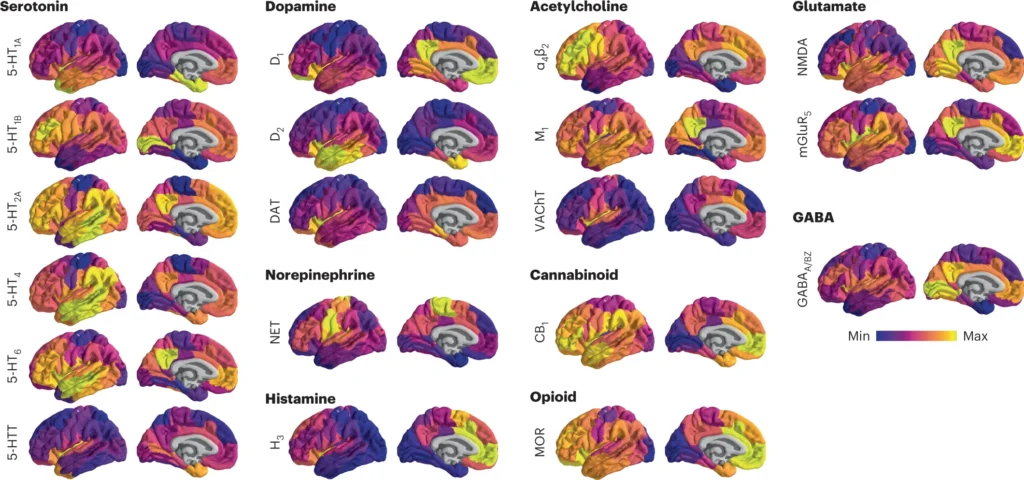
Testing Your Neurotransmitters
“There is no scientifically validated way to test neurotransmitter levels through lab testing. The best way is to assess your symptoms.”
Physicians can test neurotransmitter levels using blood, cerebrospinal fluid, or urine, but these tests often miss the mark as they don’t measure the neurotransmitters actually released in the brain.
Neurotransmitter levels in these fluids don’t correlate with brain levels due to the blood-brain barrier, which filters out many substances. Additionally, most neurotransmitters, like 95% of serotonin, are produced outside the brain—primarily in the gut, where even bacteria produce numerous neurotransmitters. Consequently, these tests may not accurately reflect the neurotransmitter activity in the brain or its impact on brain-related disorders.
Commercial lab neurotransmitter testing has been criticized for lack of scientific validity, with issues such as manipulation of results and conflicts of interest, as highlighted by NeuroScience, Inc.’s $6 million fine in 2016. Additionally, neurotransmitter levels fluctuate constantly due to their varying half-lives and the impact of daily activities, making it difficult to establish consistent norms for ideal levels.
However, there is one relatively new and more accurate method of assessing neurotransmitters: the DUTCH Complete panel. While in the past I’ve only relied on a panel like this for a urinary analysis of hormones, DUTCH is now able to provide valuable insight into specific markers associated with neurotransmitter breakdown, most notably homovanillate (HVA), a metabolite of dopamine metabolism, and vanilmandelate (VMA), a metabolite of norepinephrine and epinephrine metabolism. Low levels of HVA can be due to insufficient dopamine or poor conversion, often linked to deficiencies in methyl groups, magnesium, and NAD, leading to symptoms like cravings, sleepiness, and low motivation. Meanwhile, low VMA levels often indicate low adrenal hormone output or deficiencies in nutrients such as copper or vitamin C, which can result in fatigue, low blood pressure, and depression.
Additionally, I recommend taking the following neurotransmitter quizzes and questionnaires online:
- Dr. Eric Braverman’s Personality Type Assessment: The quiz, based on Dr. Braverman’s bestselling book The Edge Effect and his PATH Foundation’s research, helps identify deficiencies in acetylcholine, dopamine, GABA, and serotonin levels.
- Dr. Mark Hyman’s UltraMind Solution Companion Guide: This set of quizzes, adapted from his book The UltraMind Solution, helps you determine levels of neurotransmitters, vitamin D, magnesium, fatty acids, zinc, inflammation, thyroid function, and more.
- Julia Ross’s Mood Type Questionnaire: It helps determine your serotonin, endorphin, norepinephrine, and GABA levels, as well as the stability of your blood sugar levels.
- The Neurotype System: Developed by Christian Thibaudeau, a renowned strength and conditioning coach, this comprehensive questionnaire helps identify your neurological profile by evaluating personality traits to assess neurotransmitter dominance and tailor training and diet for optimal results.
- Nootopia: This brain-enhancing system starts with an online quiz to assess your needs—such as memory, focus, sleep, word recall, and creativity—followed by a custom supplements package from Nootopia and a selection of nootropics to balance your unique neurotransmitter type.
Neurotransmitters and Your Gut
Neurotransmitters produced outside of your brain, such as those produced by the bacteria in your gut, cannot cross the BBB, though amino acid neurotransmitter precursors like tryptophan and B vitamins can.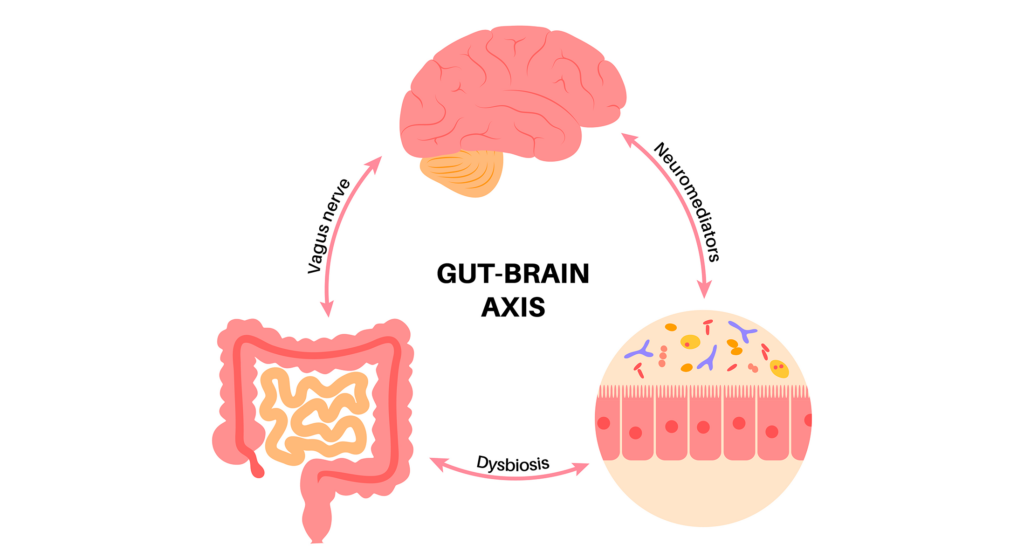
95 percent of the body’s serotonin is produced in the gut, and if all that serotonin were able to cross the BBB and accumulate in the brain, it could potentially cause similar effects to LSD. Basically, you’d be trippin’ all the time.
Neurotransmitters produced outside the brain, such as those in the gut, can influence brain health through the vagus nerve, which facilitates communication between the gut and the brain. For instance, while neurotransmitters like GABA might cross the blood-brain barrier and have a calming effect, they can also impact brain function indirectly by modulating the enteric nervous system. Disruptions in neurotransmitter levels in one area can affect the other; for example, serotonin’s role in regulating bowel movements links gut conditions like IBS-D with mental health issues, demonstrating the intricate interplay between gut and brain neurotransmitter systems.
How to Begin Restoring Your Neurotransmitters
Once you’ve identified any deficiencies or excesses, the tips listed below can help you implement supplemental, dietary, and lifestyle habits that will help bring your neurotransmitters back into balance—and if you’re not experiencing any problems at the moment, they are generally supportive of neurotransmitter health.
1. Avoid Antidepressants
Prozac, Sarafem, Paxil, Zoloft, Celexa, Lexapro, Effexor, Cymbalta, Pristiq—the list of antidepressant drugs goes on, with hundreds of millions of prescriptions handed out and billions of dollars in sales each year.
Most antidepressants affect serotonin levels in one of two ways: by directly increasing the brain’s level of serotonin or, more commonly, by blocking the reuptake of serotonin by nerve cells. Antidepressants that work this way are called selective serotonin reuptake inhibitors, or SSRIs. By preventing serotonin from being returned to neurons, SSRIs increase the brain’s amount of available serotonin.
The safety and effectiveness of SSRIs, particularly with long-term use, are highly uncertain. Over time, increasing doses of SSRIs are needed to achieve the same effect, while up to 60 percent of serotonin receptors may become downregulated due to prolonged exposure to high serotonin levels. Additionally, enzymes in the synaptic cleft adapt by becoming more efficient, leading to faster serotonin breakdown. SSRIs can also damage serotonin receptors in the liver, kidneys, and colon, affecting the brain-gut connection and appetite regulation. Evidence suggests that SSRIs may offer little clinical benefit over placebos, with meta-analyses showing no meaningful advantage, and studies that do show some benefit often neglect the significant role of supportive physician visits. Furthermore, SSRIs have not demonstrated long-term improvement in depression or suicide rates and can lead to apathy and reduced engagement in life.
Are there alternatives? You bet—the following list features a few of the best natural antidepressant strategies:
- Natural supplements: Alternatives to pharmaceutical antidepressants include acetyl-L-carnitine, probiotics, St. John’s wort, methylene blue, curcumin, peptides such as Selank, Semax, and Cerebrolysin, and even low-dose psilocybin. These options can be effective antidepressant strategies with lower risks compared to traditional medications.
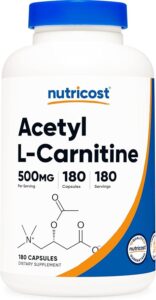
- Microbiome care: Maintaining a healthy microbiome is crucial, as antibiotics can disrupt gut bacteria that produce natural benzodiazepines, leading to sleep and anxiety issues. To support gut health, consume a variety of fermented foods, take a good probiotic, and avoid unnecessary antibiotics.
- Non-supplement strategies: Approaches like red-light therapy, sauna, cold exposure, and exercise can also serve as powerful antidepressants. For example, Finland, despite its genetic predisposition to lower levels of brain-derived neurotrophic factor, ranks among the happiest countries, likely due to its widespread sauna use.
 Finally, an important note: If you’re currently taking an antidepressant, don’t stop taking it without talking to your doctor. Abruptly stopping an antidepressant can cause unpleasant withdrawal symptoms and other side effects, so make sure you work out a tapering schedule with your doctor.
Finally, an important note: If you’re currently taking an antidepressant, don’t stop taking it without talking to your doctor. Abruptly stopping an antidepressant can cause unpleasant withdrawal symptoms and other side effects, so make sure you work out a tapering schedule with your doctor.
2. Limit Your Intake of Stimulants
My father was a gourmet coffee roaster. When I was as young as thirteen, I was sucking down espresso shots and gulping black coffee every day. By the time I was thirty, I was a bona fide addict.
I was so tolerant of caffeine that I could never settle for anything less than a 20-ounce mug o’ joe. At that point, I knew I had to do something to fix my excessive caffeine intake.
Sure, low doses of caffeine can improve mental performance and protect against Alzheimer’s, so you don’t need to avoid it entirely. But, like antidepressants, high doses of caffeine, ephedrine, ephedra, guarana, Ritalin, and other central nervous system stimulants can overwhelm the brain with excitatory neurotransmitters such as dopamine, creating resistance to neurotransmitters and long-term receptor damage. The more stimulants you take, the more you need to take to feel any benefit. As you increase your intake, you exacerbate this effect, and the cycle continues. This is the premise of the book Dopamine Nation and the reason many people now take occasional fasts from highly rewarding activities such as stimulants, hedonistic foods, phone apps, or entertainment, with the goal of “resetting” the dopamine receptors and breaking addictions or dependencies. Caffeine is another example of something to consider taking a break from every once in a while.
To kick a serious caffeine habit and reset your adenosine receptors, you have three options:
- First, you can avoid caffeine for seven to ten days, every four to eight weeks. Consider keeping a bag of decaf coffee or decaf tea in your freezer or pantry for this period so you can enjoy the wonderful aroma, taste, concentrated antioxidants, social benefits, bowel-moving glory, and many other health benefits of a hot morning beverage without exhausting your neurotransmitters.
- Second, you can drink one or two cups of coffee per day of a medium roast, which is slightly lower in caffeine but contains a high amount of antioxidants.
- Third, you can consume 100 to 200 mg of L-theanine with every cup of coffee, which will “elongate” the caffeine high and result in you probably needing fewer cups to feel consistently energized.
3. Avoid Toxins
Ten years ago, while passing through a mall or department store, I would think nothing of taking a big whiff of men’s colognes and fragrances. Same thing for those nasty “toxin-tree” air fresheners I used to hang on the rearview mirror of my car.
But these days, I literally hold my breath while rushing through the personal care aisles at Macy’s or, say, a casino, and the only air freshener you’ll find in my cars are essential oils. I also open the window of a hotel room to pull in fresh air and even call the front desk for a HEPA air filter if they have one, avoid running near polluted roads, and travel with my own soap, shampoo, and conditioner.
See, colognes, perfumes, brake dust, smog, airborne heavy metals, and even Christmas tree-shaped car air fresheners contain toxins that can drastically affect neurotransmitter production as well as your sensitivity to those neurotransmitters. The results can include brain damage and brain fog. To avoid these effects, you can take the following measures.
Once you begin to make these changes, you will find that when you do encounter an attack against your neurotransmitters, such as the wafting aromas in a department store cologne section, you will be extremely sensitive and notice it almost immediately. This may seem inconvenient, but think of it this way: once your olfactory receptors are no longer bombarded with chemicals 24-7, they become much better “canaries in the coal mine,” so to speak. So if you can’t eat a compound without getting sick, think twice about smearing it on your teeth, hair, skin, or nails.
Mastering Neurotransmitter Balance: Your Path to a Better Brain and Body
In exploring the intricate world of neurotransmitters, you’ve just uncovered vital insights into how these biochemical messengers influence your mental and physical well-being.
From understanding how neurotransmitters like serotonin, dopamine, and GABA communicate across neurons to identifying your unique neurotransmitter dominance, you’ve laid the groundwork for optimizing your brain health. You’ve also discovered practical steps to address imbalances, including avoiding excessive use of antidepressants and stimulants and steering clear of environmental toxins that can undermine neurotransmitter function.
These foundational health optimization strategies are just the start. Achieving a well-balanced brain is key to tackling issues like depression, anxiety, brain fog, and more. By implementing the techniques discussed in this part of the article, you’re on your way to enhanced focus, improved mood, and better overall health. However, this is only Part 1 of your exploration.
In Part 2 (which you’ll gain access to soon), you’ll dive deeper into SIX additional strategies that can further refine your approach to neurotransmitter health. You can expect to discover more advanced techniques for fine-tuning your brain’s chemistry, including cutting-edge supplements, dietary tweaks, and lifestyle adjustments that can lead to even greater improvements in your mental and emotional state.
Also, if you’re looking for more insights into your health and wellness, you’ll be happy to hear that I just finished updating and editing my best-selling book, Boundless. The brand new version of Boundless covers everything you could possibly want to know about optimizing your health and longevity, including how to boost your mitochondrial function, reboot your circadian rhythm, increase your libido, manage chronic conditions, enhance your mind using new smart drugs and peptides, reverse aging, improve sleep, burn fat, maintain health routines at home and while traveling, and much more!
If you’re ready to uncover a treasure trove of the latest science-backed strategies for improving every aspect of your mind, body, and spirit, you can click this link to pre-order your new updated copy of Boundless.
Additionally, if you have any questions, comments, or feedback, you can drop me a line in the comments below, and I’ll be sure to respond!






